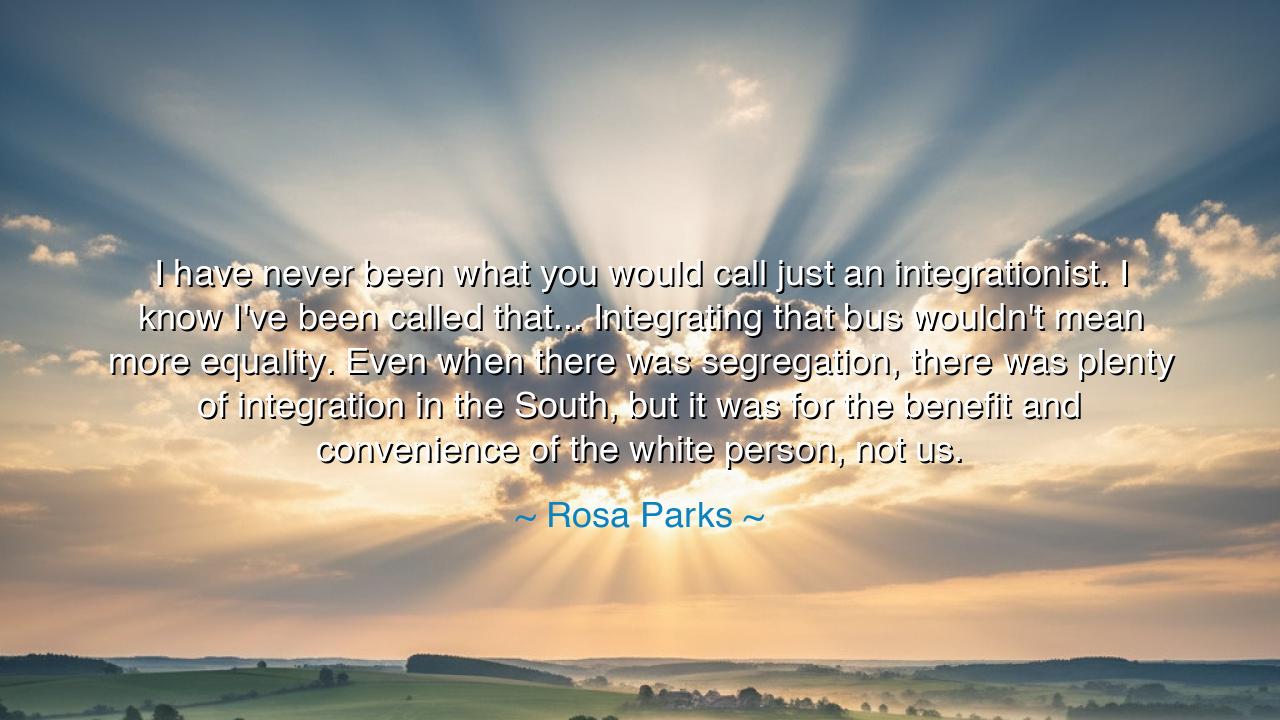
I have never been what you would call just an integrationist. I
I have never been what you would call just an integrationist. I know I've been called that... Integrating that bus wouldn't mean more equality. Even when there was segregation, there was plenty of integration in the South, but it was for the benefit and convenience of the white person, not us.






“I have never been what you would call just an integrationist. I know I've been called that... Integrating that bus wouldn't mean more equality. Even when there was segregation, there was plenty of integration in the South, but it was for the benefit and convenience of the white person, not us.” Thus spoke Rosa Parks, the woman whose quiet defiance on a Montgomery bus became thunder across a nation. Her words are not merely a reflection on that single act of resistance, but a deeper revelation of her philosophy: that equality is not measured by shared spaces alone, but by shared dignity, power, and opportunity.
The meaning of her words cuts through illusions. Parks reminds us that to sit side by side with those who still hold control is not true equality, but merely the appearance of it. Integration, when structured for the convenience of the oppressor, does not liberate the oppressed—it simply reshapes the chains. She warns against mistaking access for freedom, against confusing proximity with justice. To integrate the bus was not the end of her struggle; the end was and remains the recognition of Black humanity as equal in every measure.
The origin of her thought lies in the lived reality of the South, where Black people and white people worked together, lived near one another, and interacted daily, but always under an order that privileged one and diminished the other. Black women nursed white children, Black men labored in white fields, Black citizens entered white homes as servants. There was constant integration, but not in the spirit of fairness—only for the benefit of white society. This is why Parks could never be satisfied with integration alone: she knew that justice required more than sitting in the same bus seat; it demanded equal standing in the community of humankind.
Consider the story of Homer Plessy, whose case gave birth to the infamous “separate but equal” doctrine in 1896. Plessy was allowed to ride in the train, but not in the section designated for whites. The court upheld segregation, claiming equality existed even in division. Yet what Rosa Parks reveals is sharper: even when the spaces were shared, when labor and presence were integrated, it was still an unequal integration, designed to uphold a system of racial supremacy. Thus, her act of refusal on that bus was not for a seat alone, but for the principle that integration without equality is hollow.
Her words are heroic because they teach us to look deeper than surface victories. Parks was not deceived into believing that simply ending segregation laws would end racism. She knew that true liberation requires dismantling the structures of convenience that benefit one group at the expense of another. She challenges us to see whether our own societies, though outwardly diverse and integrated, may still carry systems that favor some while exploiting others.
The lesson is timeless: do not confuse symbolism with substance. True equality is not granted by proximity but by justice—by equal rights, equal access, equal voice. We must labor not merely for integrated schools, buses, or workplaces, but for societies where no one group holds dominance over another. Parks’ words summon us to vigilance, lest we settle for illusions of progress while injustice remains beneath the surface.
Practical wisdom follows: in your own community, examine whether integration has truly brought fairness. Ask whether voices are equally heard, whether opportunities are equally given, whether dignity is equally honored. Stand firm, as Rosa Parks did, against the comfort of half-measures. For her act was never about a bus—it was about the demand that all people be treated as full human beings.
Thus her voice, calm yet unyielding, comes to us like the wisdom of the ancients. Integration without equality is only shadow, not substance. Rosa Parks calls us not only to sit together, but to live together in fairness, justice, and shared dignity. Let us carry her lesson forward: to strive always beyond appearances, until true equality is not a convenience for some, but a reality for all.






AAdministratorAdministrator
Welcome, honored guests. Please leave a comment, we will respond soon